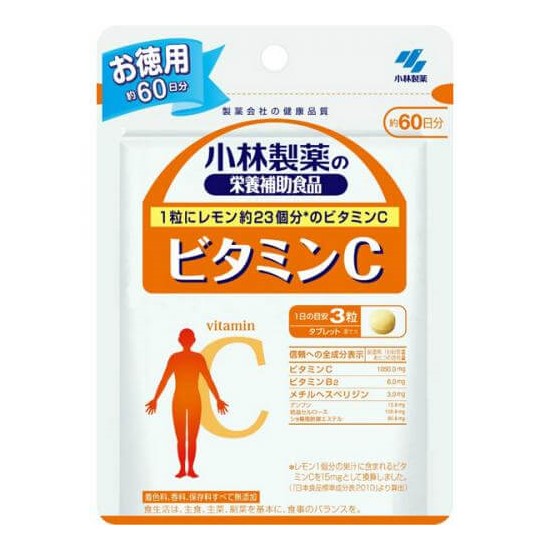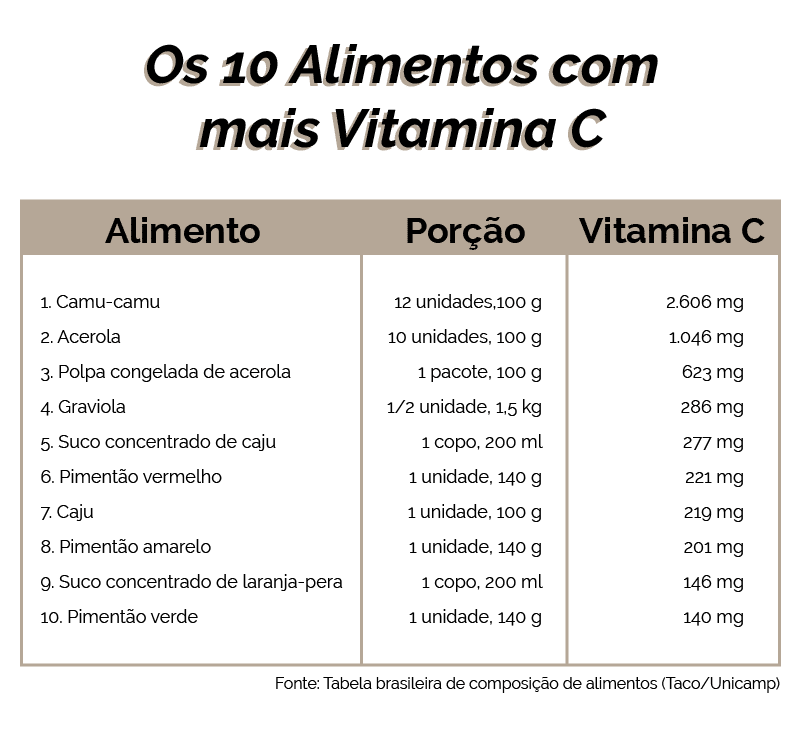This is a reader-friendly overview of Vitamin C. For more details, see our health professional fact sheet on Vitamin C.
For information on vitamin C and COVID-19, see Dietary Supplements in the Time of COVID-19.
What is vitamin C and what does it do?
Vitamin C, also known as ascorbic acid, is a water-soluble nutrient found in some foods. In the body, it acts as an antioxidant, helping to protect cells from the damage caused by free radicals. Free radicals are compounds formed when our bodies convert the food we eat into energy. People are also exposed to free radicals in the environment from cigarette smoke, air pollution, and ultraviolet light from the sun.
The body also needs vitamin C to make collagen, a protein required to help wounds heal. In addition, vitamin C improves the absorption of iron from plant-based foods and helps the immune system work properly to protect the body from disease.
How much vitamin C do I need?
The amount of vitamin C you need each day depends on your age. Average daily recommended amounts for different ages are listed below in milligrams (mg).
| Life Stage | Recommended Amount |
| Birth to 6 months | 40 mg |
| Infants 7–12 months | 50 mg |
| Children 1–3 years | 15 mg |
| Children 4–8 years | 25 mg |
| Children 9–13 years | 45 mg |
| Teens 14–18 years (boys) | 75 mg |
| Teens 14–18 years (girls) | 65 mg |
| Adults (men) | 90 mg |
| Adults (women) | 75 mg |
| Pregnant teens | 80 mg |
| Pregnant women | 85 mg |
| Breastfeeding teens | 115 mg |
| Breastfeeding women | 120 mg |
If you smoke, add 35 mg to the above values to calculate your total daily recommended amount.
What foods provide vitamin C?
Fruits and vegetables are the best sources of vitamin C. You can get recommended amounts of vitamin C by eating a variety of foods including the following:
- Citrus fruits (such as oranges and grapefruit) and their juices, as well as red and green pepper and kiwifruit, which have a lot of vitamin C.
- Other fruits and vegetables—such as broccoli, strawberries, cantaloupe, baked potatoes, and tomatoes—which also have vitamin C.
- Some foods and beverages that are fortified with vitamin C. To find out if vitamin C has been added to a food product, check the product labels.
The vitamin C content of food may be reduced by prolonged storage and by cooking. Steaming or microwaving may lessen cooking losses. Fortunately, many of the best food sources of vitamin C, such as fruits and vegetables, are usually eaten raw.
What kinds of vitamin C dietary supplements are available?
Most multivitamins have vitamin C. Vitamin C is also available alone as a dietary supplement or in combination with other nutrients. The vitamin C in dietary supplements is usually in the form of ascorbic acid, but some supplements have other forms, such as sodium ascorbate, calcium ascorbate, other mineral ascorbates, and ascorbic acid with bioflavonoids. Research has not shown that any form of vitamin C is better than the other forms.
Am I getting enough vitamin C?
Most people in the United States get enough vitamin C from foods and beverages. However, certain groups of people are more likely than others to have trouble getting enough vitamin C:
- People who smoke and those who are exposed to secondhand smoke, in part because smoke increases the amount of vitamin C that the body needs to repair damage caused by free radicals. People who smoke need 35 mg more vitamin C per day than nonsmokers.
- Infants who are fed evaporated or boiled cow's milk, because cow's milk has very little vitamin C and heat can destroy vitamin C. Cow's milk is not recommended for infants under 1 year of age. Breast milk and infant formula have adequate amounts of vitamin C.
- People who eat a very limited variety of food.
- People with certain medical conditions such as severe malabsorption, some types of cancer, and kidney disease requiring hemodialysis.
What happens if I don't get enough vitamin C?
Vitamin C deficiency is rare in the United States and Canada. People who get little or no vitamin C (below about 10 mg per day) for many weeks can get scurvy. Scurvy causes fatigue, inflammation of the gums, small red or purple spots on the skin, joint pain, poor wound healing, and corkscrew hairs. Additional signs of scurvy include depression as well as swollen, bleeding gums and loosening or loss of teeth. People with scurvy can also develop anemia. Scurvy is fatal if it is not treated.
What are some effects of vitamin C on health?
Scientists are studying vitamin C to understand how it affects health. Here are several examples of what this research has shown.
Cancer prevention and treatment
People with high intakes of vitamin C from fruits and vegetables might have a lower risk of getting many types of cancer, such as lung, breast, and colon cancer. However, taking vitamin C supplements, with or without other antioxidants, doesn't seem to protect people from getting cancer.
It is not clear whether taking high doses of vitamin C is helpful as a treatment for cancer. Vitamin C's effects appear to depend on how it is administered to the patient. Oral doses of vitamin C can't raise blood levels of vitamin C nearly as high as intravenous doses given through injections. A few studies in animals and test tubes indicate that very high blood levels of vitamin C might shrink tumors. But more research is needed to determine whether high-dose intravenous vitamin C helps treat cancer in people.
Vitamin C dietary supplements and other antioxidants might interact with chemotherapy and radiation therapy for cancer. People being treated for cancer should talk with their oncologist before taking vitamin C or other antioxidant supplements, especially in high doses.
Cardiovascular disease
People who eat lots of fruits and vegetables seem to have a lower risk of cardiovascular disease. Researchers believe that the antioxidant content of these foods might be partly responsible for this association because oxidative damage is a major cause of cardiovascular disease. However, scientists aren't sure whether vitamin C itself, either from food or supplements, helps protect people from cardiovascular disease. It is also not clear whether vitamin C helps prevent cardiovascular disease from getting worse in people who already have it.
Age-related macular degeneration (AMD) and cataracts
AMD and cataracts are two of the leading causes of vision loss in older people. Researchers do not believe that vitamin C and other antioxidants affect the risk of getting AMD. However, research suggests that vitamin C combined with other nutrients might help slow AMD progression.
In a large study among older people with AMD who were at high risk of developing advanced AMD, those who took a daily dietary supplement with 500 mg vitamin C, 80 mg zinc, 400 IU vitamin E, 15 mg beta-carotene, and 2 mg copper for about 6 years had a lower chance of developing advanced AMD. They also had less vision loss than those who did not take the dietary supplement. People who have or are developing the disease might want to talk with their doctor about taking dietary supplements.
The relationship between vitamin C and cataract formation is unclear. Some studies show that people who get more vitamin C from foods have a lower risk of getting cataracts. But further research is needed to clarify this association and to determine whether vitamin C supplements affect the risk of getting cataracts.
The common cold
Although vitamin C has long been a popular remedy for the common cold, research shows that for most people, vitamin C supplements do not reduce the risk of getting the common cold. However, people who take vitamin C supplements regularly might have slightly shorter colds or somewhat milder symptoms when they do have a cold. Using vitamin C supplements after cold symptoms start does not appear to be helpful.
Can vitamin C be harmful?
Taking too much vitamin C can cause diarrhea, nausea, and stomach cramps. In people with a condition called hemochromatosis, which causes the body to store too much iron, high doses of vitamin C could worsen iron overload and damage body tissues.
The daily upper limits for vitamin C include intakes from all sources—food, beverages, and supplements—and are listed below:
| Life Stage | Upper Limit |
| Birth to 12 months | Not established |
| Children 1–3 years | 400 mg |
| Children 4–8 years | 650 mg |
| Children 9–13 years | 1,200 mg |
| Teens 14–18 years | 1,800 mg |
| Adults | 2,000 mg |
Does vitamin C interact with medications or other dietary supplements?
Vitamin C dietary supplements can interact or interfere with medicines that you take. Here are several examples:
- Vitamin C dietary supplements might interact with cancer treatments, such as chemotherapy and radiation therapy. It is not clear whether vitamin C might have the unwanted effect of protecting tumor cells from cancer treatments or whether it might help protect normal tissues from getting damaged. If you are being treated for cancer, check with your healthcare provider before taking vitamin C or other antioxidant supplements, especially in high doses.
- In one study, vitamin C plus other antioxidants (such as vitamin E, selenium, and beta-carotene) reduced the heart-protective effects of two drugs taken in combination (a statin and niacin) to control blood-cholesterol levels. It is not known whether this interaction also occurs with other statins. Healthcare providers should monitor lipid levels in people taking both statins and antioxidant supplements.
Tell your doctor, pharmacist, and other healthcare providers about any dietary supplements and medicines you take. They can tell you if those dietary supplements might interact or interfere with your prescription or over-the-counter medicines or if the medicines might interfere with how your body absorbs, uses, or breaks down nutrients.
Vitamin C and healthful eating
People should get most of their nutrients from food and beverages, according to the federal government's Dietary Guidelines for Americans. Foods contain vitamins, minerals, dietary fiber and other components that benefit health. In some cases, fortified foods and dietary supplements are useful when it is not possible to meet needs for one or more nutrients (e.g., during specific life stages such as pregnancy). For more information about building a healthy dietary pattern, see the Dietary Guidelines for Americans  and the U.S. Department of Agriculture's MyPlate.
and the U.S. Department of Agriculture's MyPlate.
Where can I find out more about vitamin C?
Disclaimer
This fact sheet by the Office of Dietary Supplements (ODS) provides information that should not take the place of medical advice. We encourage you to talk to your healthcare providers (doctor, registered dietitian, pharmacist, etc.) about your interest in, questions about, or use of dietary supplements and what may be best for your overall health. Any mention in this publication of a specific product or service, or recommendation from an organization or professional society, does not represent an endorsement by ODS of that product, service, or expert advice.

.jpg)








:max_bytes(150000):strip_icc()/cdn.cliqueinc.com__cache__posts__215688__-2075314-1486614664.700x0c-2e779216144b4901bbcf7754ad62e969.jpg)
:max_bytes(150000):strip_icc()/cdn.cliqueinc.com__cache__posts__215688__-2075315-1486614664.700x0c-3926f4bcb470488bb72d8e11c7eeb934.jpg)
:max_bytes(150000):strip_icc()/cdn.cliqueinc.com__cache__posts__215688__-2075311-1486614442.700x0c-7b7168c85e984e858755968ea9bfbdc6.png)
:max_bytes(150000):strip_icc()/cdn.cliqueinc.com__cache__posts__215688__-2075312-1486614442.700x0c-10ba45f0e93c4229986279e78679bed3.png)
:max_bytes(150000):strip_icc()/cdn.cliqueinc.com__cache__posts__215688__-2075375-1486628177.700x0c-651f3e143e2b48d08b11d9b8ce3b53d8.png)
:max_bytes(150000):strip_icc()/cdn.cliqueinc.com__cache__posts__215688__-2075376-1486628245.700x0c-9b346c5015ff48aaa7ba66d6a1cc4c9b.png)
:max_bytes(150000):strip_icc()/cdn.cliqueinc.com__cache__posts__215688__-2075308-1486614166.700x0c-b39bafefc31e475cac96b98b16bf4259.jpg)
:max_bytes(150000):strip_icc()/cdn.cliqueinc.com__cache__posts__215688__-2075309-1486628504.700x0c-e2712e4ff8fd4bc9af299d09147b89ff.png)









